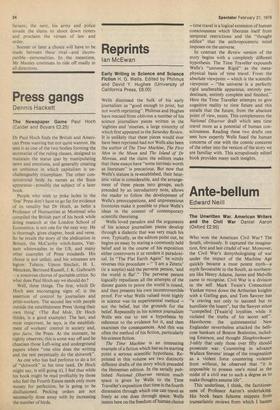Reprints
Ian McEwan
Early Writing in Science and Science Fiction H. G. Wells. Edited by Philmus and David Y. Hughes (University of California Press, £8.00) Wells dismissed the bulk of his early journalism as "good enough to print, but not worth reprinting". Philmus and Hughes have rescued from oblivion a number of his science journalism pieces written in the 'eighties and 'nineties, a large minority of which first appeared in the Saturday Review. It is unlikely that these pieces would ever have been reprinted had not Wells also been the author of The Time Machine, The First Men in the Moon and The Island of Dr Moreau, and the claim the editors make that these essays have "some intrinsic worth as literature" is precarious. But now that Wells's stature is re-established, their heuristic value is considerable, and the arrangement of these pieces into groups, each preceded by an introductory note, allows the reader to follow the development of Wells's preoccupations, and unpretentious footnotes make it possible to place Wells's ideas in the context of contemporary scientific theorising.
Wells loved paradox and the arguments of his science journalism pieces develop through a dialectic that was very much his own. Typically, as the editors point out, he begins an essay by stating a commonly held belief and in the course of his exposition either controverts it or renders it paradoxical. In "The Flat Earth Again" he wittily reverses this procedure — " 'I am a Zetetic' (ie a sceptic) said the perverse person, 'and the world is fiat'," The perverse person logically repudiates all the attempts of the dinner guests to prove the world is round, and then presents his own incontrovertible proof. For what Wells valued most highly in science was its experimental method — not the belief, but the grounds for the belief. Repeatedly in his science journalism Wells sets out to test a hypothesis by reference to the evidence for it, and then examines the consequences. And this was often the method of his fiction, particularly his science fiction.
The Time Machine is an interesting example of a fiction which has as its starting point a serious scientific hypothesis. Reprinted in this volume are two distinctly different drafts of the story which preceded the Heineman edition. In the serially published National ,Observer version much space is given by Wells to the Time Traveller's exposition that time is the fourth dimension through which one can travel as freely as one does through space. Wells insists here on the freedom of human choice
— time travel is a logical extension of human consciousness which liberates itself from temporal restrictions and the "thought edifice" that the anthropocentric mind imposes on the universe.
In contrast the Review version of the story begins with a completely different hypothesis. The Time Traveller expounds Wells's "universe Rigid" as the metaphysical basis of time travel. From the absolute viewpoint — which is the scientific viewpoint — "the universe is a perfectly rigid unalterable apparatus, entirely predestinate, entirely complete and finished." Here the Time Traveller attempts to give cognitive reality to time future and this entails that the future, from the absolute point of view, exists. This complements the National Observer draft which sees time travel more as a potential of human consciousness. Reading these two drafts one sees how expertly Wells fused the human concerns of one with the cosmic concerns of the other into the version of the story we are familiar with. This scrupulously edited book provides many such insights.


































 Previous page
Previous page